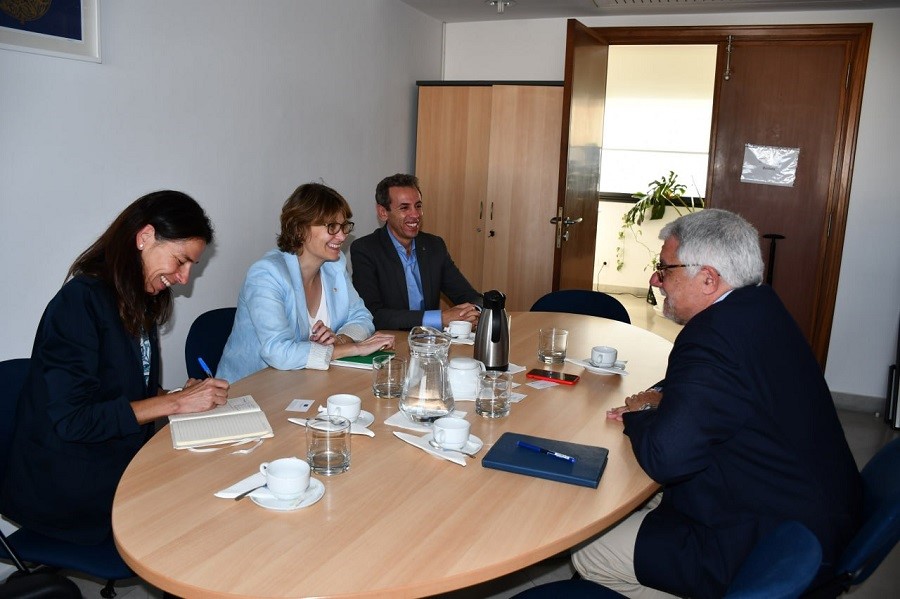- The Minister for Foreign Action and European Union met the European Union’s Deputy Head of Delegation to Tunisia, Francisco Acosta, and conveyed the Catalan Government’s firm commitment to promoting the Mediterranean macroregion
- Serret seeks alliances on the southern shore of the Mediterranean for the macroregion project

Within the framework of her institutional trip to Tunisia, the Minister for Foreign Action and European Union, Meritxell Serret i Aleu, met the European Union’s Deputy Head of Delegation to Tunisia, Francisco Acosta, in Tunis today.
Serret explained to Acosta that Euro-Mediterranean policies are a priority for the Catalan Government, and that Catalonia is leading the creation of the Mediterranean macroregion. “The Mediterranean macroregion is one of the major political commitments that we are undertaking from Catalonia, together with other Mediterranean governments, and it must enable us to make even greater progress in the fight to tackle climate change in the Mediterranean, and we want this to take place with the involvement of all the shores of the Mediterranean,” said Serret.
One of the primary objectives of Minister Serret’s trip to Tunisia is to establish partnerships for the development of the macroregional strategy. As a Euro-Mediterranean project, the aim is to involve the partners on the southern shore, with which Catalonia has a special relationship. “The project has been a common factor in many of the international contacts we have been making for some months,” said Serret, who explained that “the project has recently been gaining momentum, and we hope that in the coming months we will be able to continue adding partners, and that the European institutions will respond and that it will soon become a reality.”
Establishing partnerships for the macroregion
Catalonia has led the promotion of the Mediterranean macroregion from the outset, as it is committed to this project, which should help strengthen Euro-Mediterranean cooperation to provide a response to global challenges.
Among other initiatives, it has organised the Friends of the Mediterranean Macroregion alliance, which aims to build a community of key institutions and stakeholders which believe that, despite its complexity, the time has come to strengthen cooperation in the Mediterranean, exploring its richness and potential on a more consistent basis, with greater complementarity and solidarity.
As part of the work to promote the macroregion, the Catalan Government has held several meetings to share the Catalan strategy for undertaking this initiative with various actors, such as the Vice-President of the Regional Council of Tangier-Tetouan-Al Hoceima, Rafia el Mansouri, and the Vice-President of the French region of Provence-Alpes-Côte d’Azur, Jean-Pierre Colin.
More recently, Catalonia’s President Aragonès met the President of Occitania, Carole Delga, in mid-May, and he expressed his conviction regarding the promotion of the macroregion and making Europe look towards the Mediterranean. Moreover, in his inauguration as president of the Euroregion Pyrenees Mediterranean, which the Government of Catalonia holds until 2025, Aragonès also highlighted the project’s momentum.
The Catalan Government’s agenda to defend the creation of the Mediterranean macroregion continues this June, with President Aragonès’s trip to Marseille and Minister Serret’s journey to Tunisia, where she is conveying the Catalan strategy to make the macroregion a reality to stakeholders on the southern shore, including Tunisians and the European Union delegation in the country.
The Mediterranean macroregion
The Mediterranean macroregion is a project by the Intermediterranean Commission of the Conference of Peripheral Maritime Regions (CIM-CPMR), made up of around 40 Mediterranean regions, mostly in the European Union, but also on the Mediterranean’s southern shore. Catalonia and the French region of Provence-Alps-Côte d’Azur are leading the macroregional working group, which is responsible for this initiative.
The regions and cities of the European Union believe that the development of a macroregional strategy for the Mediterranean basin would enable ecological and digital transitions facing the region to be addressed together, as well as the region’s socio-economic, migration and security challenges.
While the populations of the Mediterranean share a common historical and cultural heritage, major differences in levels of development affect the region’s stability, prosperity and security. At the same time, the Mediterranean basin is particularly subject to the consequences of climate change, making it one of the regions of the world most exposed to the risks and dangers of the environmental crisis. As a result of climate change, water scarcity in the Mediterranean region could affect more than 250 million people in the next 20 years.
An overarching cooperation framework such as the macroregion for the Mediterranean basin would reinforce cooperation across the region in order to address the challenges and threats it faces.